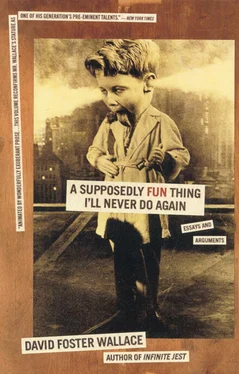David Wallace - A Supposedly Fun Thing I'll Never Do Again
Здесь есть возможность читать онлайн «David Wallace - A Supposedly Fun Thing I'll Never Do Again» весь текст электронной книги совершенно бесплатно (целиком полную версию без сокращений). В некоторых случаях можно слушать аудио, скачать через торрент в формате fb2 и присутствует краткое содержание. Год выпуска: 1996, Издательство: Back Bay Books, Жанр: Публицистика, Биографии и Мемуары, на английском языке. Описание произведения, (предисловие) а так же отзывы посетителей доступны на портале библиотеки ЛибКат.
- Название:A Supposedly Fun Thing I'll Never Do Again
- Автор:
- Издательство:Back Bay Books
- Жанр:
- Год:1996
- ISBN:нет данных
- Рейтинг книги:5 / 5. Голосов: 1
-
Избранное:Добавить в избранное
- Отзывы:
-
Ваша оценка:
- 100
- 1
- 2
- 3
- 4
- 5
A Supposedly Fun Thing I'll Never Do Again: краткое содержание, описание и аннотация
Предлагаем к чтению аннотацию, описание, краткое содержание или предисловие (зависит от того, что написал сам автор книги «A Supposedly Fun Thing I'll Never Do Again»). Если вы не нашли необходимую информацию о книге — напишите в комментариях, мы постараемся отыскать её.
.
A Supposedly Fun Thing I'll Never Do Again — читать онлайн бесплатно полную книгу (весь текст) целиком
Ниже представлен текст книги, разбитый по страницам. Система сохранения места последней прочитанной страницы, позволяет с удобством читать онлайн бесплатно книгу «A Supposedly Fun Thing I'll Never Do Again», без необходимости каждый раз заново искать на чём Вы остановились. Поставьте закладку, и сможете в любой момент перейти на страницу, на которой закончили чтение.
Интервал:
Закладка:
Not that these realities about actors and phosphenes and furniture are unknown to us. We choose to ignore them. They are part of the disbelief we suspend. But it’s an awfully heavy load to hoist aloft for six hours a day; illusions of voyeurism and privileged access require serious complicity from the viewer. How can we be made so willingly to acquiesce to the delusion that the people on the TV don’t know they’re being watched, to the fantasy that we’re somehow transcending privacy and feeding on unself-conscious human activity? There might be lots of reasons why these unrealities are so swallowable, but a big one is that the performers behind the glass are — varying degrees of thespian talent notwithstanding — absolute geniuses at seeming unwatched. Make no mistake — seeming unwatched in front of a TV camera is an art. Take a look at how non-professionals act when a TV camera is pointed at them: they often spaz out, or else they go all stiff, frozen with self-consciousness. Even PR people and politicians are, in terms of being on camera, rank amateurs. And we love to laugh at how stiff and fake non-pros appear on television. How unnatural.
But if you’ve ever once been the object of that terrible blank round glass stare, you know all too well how paralyzingly self-conscious it makes you feel. A harried guy with earphones and a clipboard tells you to “act natural” as your face begins to leap around on your skull, struggling for a seeming-unwatched expression that feels so impossible because “seeming unwatched” is, like “acting natural,” oxymoronic. Try hitting a golf ball right after someone asks you whether you in- or exhale on your backswing, or getting promised lavish rewards if you can avoid thinking of a green rhinoceros for ten seconds, and you’ll get some idea of the truly heroic contortions of body and mind that must be required for a David Duchovny or Don Johnson to act unwatched as he’s watched by a lens that’s an overwhelming emblem of what Emerson, years before TV, called “the gaze of millions.” 2
For Emerson, only a certain very rare species of person is fit to stand this gaze of millions. It is not your normal, hardworking, quietly desperate species of American. The man who can stand the megagaze is a walking imago, a certain type of transcendent semihuman who, in Emerson’s phrase, “carries the holiday in his eye.” The Emersonian holiday that television actors’ eyes carry is the promise of a vacation from human self-consciousness. Not worrying about how you come across. A total unallergy to gazes. It is contemporarily heroic. It is frightening and strong. It is also, of course, an act, for you have to be just abnormally self-conscious and self-controlled to appear unwatched before cameras and lenses and men with clipboards. This self-conscious appearance of unself-consciousness is the real door to TV’s whole mirror-hall of illusions, and for us, the Audience, it is both medicine and poison.
For we gaze at these rare, highly-trained, unwatched-seeming people for six hours daily. And we love these people. In terms of attributing to them true supernatural assets and desiring to emulate them, it’s fair to say we sort of worship them. In a real Joe Briefcase-world that shifts ever more starkly from some community of relationships to networks of strangers connected by self-interest and technology, the people we espy on TV offer us familiarity, community. Intimate friendship. But we split what we see. The characters may be our “close friends,” but the performers are beyond strangers: they’re imagos, demigods, and they move in a different sphere, hang out with and marry only each other, seem even as actors accessible to Audience only via the mediation of tabloid, talk show, EM signal. And yet both actors and characters, so terribly removed and filtered, seem so terribly, gloriously natural when we watch.
Given how much we watch and what watching means, it’s inevitable, for those of us fictionists or Joe Briefcases who fancy ourselves voyeurs, to get the idea that these persons behind the glass — persons who are often the most colorful, attractive, animated, alive people in our daily experience — are also people who are oblivious to the fact that they are watched. This illusion is toxic. It’s toxic for lonely people because it sets up an alienating cycle (viz. “Why can’t I be like that?” etc.), and it’s toxic for writers because it leads us to confuse actual fiction-research with a weird kind of fiction- consumption . Self-conscious people’s oversensitivity to real humans tends to put us before the television and its one-way window in an attitude of relaxed and total reception, rapt. We watch various actors play various characters, etc. For 360 minutes per diem, we receive unconscious reinforcement of the deep thesis that the most significant quality of truly alive persons is watchableness, and that genuine human worth is not just identical with but rooted in the phenomenon of watching. Plus the idea that the single biggest part of real watchableness is seeming to be unaware that there’s any watching going on. Acting natural. The persons we young fiction writers and assorted shut-ins study, feel for, feel through most intently are, by virtue of a genius for feigned unself-consciousness, fit to stand people’s gazes. And we, trying desperately to be nonchalant, perspire creepily on the subway.
the finger
Existentiovoyeuristic conundra notwithstanding, there’s no denying the simple fact that people in the U.S.A. watch so much television basically because it’s fun. I know I watch for fun, most of the time, and that at least 51 % of the time I do have fun when I watch. This doesn’t mean I do not take television seriously. One big claim of this essay is going to be that the most dangerous thing about television for U.S. fiction writers is that we don’t take it seriously enough as both a disseminator and a definer of the cultural atmosphere we breathe and process, that many of us are so blinded by constant exposure that we regard TV the way Reagan’s lame F.C.C. chairman Mark Fowler professed to see it in 1981, as “just another appliance, a toaster with pictures.” 3
It’s undeniable, nevertheless, that watching television is pleasurable, and it may seem odd that so much of the pleasure my generation takes from television lies in making fun of it. But you have to remember that younger Americans grew up as much with people’s disdain for TV as we did with TV itself. I knew it was a “vast wasteland” way before I knew who Newton Minow and Mark Fowler were. And it really is fun to laugh cynically at television — at the way the laughter from sitcoms’ “live studio audiences” is always suspiciously constant in pitch and duration, or at the way travel is depicted on The Flintstones by having the exact same cut-rate cartoon tree, rock, and house go by four times. It’s fun, when a withered June Allyson comes on-screen for Depend Adult Undergarments and says “If you have a bladder-control problem, you’re not alone,” to hoot and shout back “Well chances are you’re alone quite a bit, June!”
Most scholars and critics who write about U.S. popular culture, though, seem both to take TV very seriously and to suffer terrible pain over what they see. There’s this well-known critical litany about television’s vapidity and irrealism. The litany is often even cruder and triter than the shows the critics complain about, which I think is why most younger Americans find professional criticism of television less interesting than professional television itself. I found solid examples of what I’m talking about on the first day I even looked. The New York Times Arts & Leisure Section for Sunday, 8/05/90, simply bulged with bitter critical derision for TV, and some of the most unhappy articles weren’t about low-quality programming so much as about how TV’s become this despicable instrument of cultural decay. In a summary review of all 1990’s “crash and burn” summer box-office hits in which “realism… seems to have gone almost entirely out of fashion,” it takes Janet Maslin only a paragraph to locate her true anti-reality culprit: “We may be hearing about ‘real life’ only on television shows made up of fifteen-second sound bites (in which ‘real people’ not only speak in brief, neat truisms but actually seem to think that way, perhaps as a result of having watched too much reality-molding television themselves).” 4And one Stephen Holden, in what starts out as a scathing assessment of the pass pop music’s come to, feels he knows perfectly well what’s behind what he hates: “Pop music is no longer a world unto itself but an adjunct of television, whose stream of commercial images projects a culture in which everything is for sale and the only things that count are fame, power, and the body beautiful.” 5This stuff just goes on and on, article after article, in the Times. The only Arts & Leisure piece I could find with anything upbeat to say about TV that morning was a breathless article on how lots of Ivy League graduates are now flying straight from school to New York and Los Angeles to become television writers and are clearing well over $200,000 to start and enjoying rapid advancement to harried clipboarded production status. In this regard, 8/05’s Times is a good example of a strange mix that’s been around for a few years now: weary contempt for television as a creative product and cultural force, combined with beady-eyed fascination about the actual behind-the-glass mechanics of making that product and projecting that force.
Читать дальшеИнтервал:
Закладка:
Похожие книги на «A Supposedly Fun Thing I'll Never Do Again»
Представляем Вашему вниманию похожие книги на «A Supposedly Fun Thing I'll Never Do Again» списком для выбора. Мы отобрали схожую по названию и смыслу литературу в надежде предоставить читателям больше вариантов отыскать новые, интересные, ещё непрочитанные произведения.
Обсуждение, отзывы о книге «A Supposedly Fun Thing I'll Never Do Again» и просто собственные мнения читателей. Оставьте ваши комментарии, напишите, что Вы думаете о произведении, его смысле или главных героях. Укажите что конкретно понравилось, а что нет, и почему Вы так считаете.












